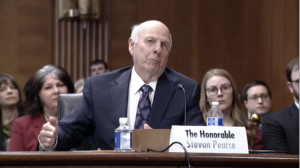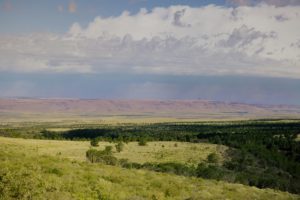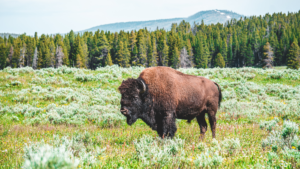For immediate release
April 8, 2024
Contacts:
- Erik Molvar, Western Watersheds Project, 307-399-7910, emolvar@westernwatersheds.org
- Kelly Nokes, Western Environmental Law Center, 575-613-8051, nokes@westernlaw.org
- Suzanne Asha Stone, International Wildlife Coexistence Network, 208-861-5177, suzanne@wildlifecoexistence.org
- Brooks Fahy, Predator Defense, 541-937-4261, brooks@predatordefense.org
- Roger Dobson, Protect the Wolves, 714-660-7208, roger@protectthewolves.com
- KC York, Trap Free Montana, 406-218-1170, info@trapfreemt.org
- Lizzy Pennock, WildEarth Guardians, 406-830-8924, lpennock@wildearthguardians.org
- George Nickas, Wilderness Watch, 406-542-2048, gnickas@wildernesswatch.org
- Mike Garrity, Alliance for the Wild Rockies, 406-459-5936, wildrockies@gmail.com
- Jeff Juel, Friends of the Clearwater, 509-688-5956, jeffjuel@wildrockies.org
- Julian Matthews, Nimiipuu Protecting the Environment, 509-330-0023, protectingnimiipuu@gmail.com
Conservation groups challenge federal decision to deny western wolves protections
BOISE, Ida. – Today, 10 conservation groups challenged the U.S. Fish and Wildlife Service (“the Service”) over its failure to list western wolves under the Endangered Species Act (non-stamped complaint here, stamped complaint here. The Service’s “not warranted” finding ignores obvious threats to the species, runs contrary to the best available science, and relies on flawed population models for its determination.
“The current killing regimes in Idaho, Montana, and Wyoming put wolves at obvious risk of extinction in the foreseeable future, and this core population is key to wolf survival in the West,” said Erik Molvar, a wildlife biologist and executive director of Western Watersheds Project. “The U.S. Fish and Wildlife Service is playing politics, pretending that the anti-wolf agendas of state governments constitute adequate conservation regulations and that the small and vulnerable condition of fledgling wolf populations elsewhere in the West somehow protect the species from extinction.”
In its “not warranted” finding, the Service confirmed that a western U.S. distinct population segment (DPS) is a valid entity for listing consideration, but cites a deeply flawed modeling exercise to conclude there is no risk of extinction for wolves in the West either now or in the foreseeable future.
A 2023 study by Dr. Robert Crabtree and others found the Montana state population model was badly biased, overestimating total wolf populations by as much as 50%. These researchers found this flawed population model constitutes a “precariously misleading situation for decision-makers that threatens wolf populations.” In an earlier analysis, Dr. Scott Creel found that data used in both the Idaho and Montana population models violate the assumptions of the models, meaning population estimations generated by the models are unreliable. Yet the Service relied on these flawed population estimates to conclude wolves in the West are not at risk of extinction.
A second 2023 study by wolf geneticist Dr. Bridgett vonHoldt and others found wolf populations in the northern Rockies are losing genetic variability and below genetic minimum viable population levels at today’s populations. At present, wolf populations in California and the Cascade Range of western Oregon and Washington are far below minimum viable population thresholds, and Utah, Nevada, and northern Arizona, all of which have historic gray wolf habitat, have no wolves at all.
“The Service’s finding seems to give the green light for states hostile to wolves to follow suit with Idaho, Montana, and Wyoming’s aggressive killing regimes if they are eventually delisted and transferred to state management West wide,” said Kelly Nokes, an attorney with the Western Environmental Law Center representing the groups. “But wolves have yet to recover across vast portions of the West, and they exist in only small populations in the West Coast and Colorado habitats they are slowly reinhabiting. This legal challenge asks only for the protections needed for this iconic species to be rightfully restored across the West’s wild landscapes—protections that some states have shown only the Endangered Species Act can really provide.”
“Idaho, Montana and Wyoming have become the poster children for what happens when politics trumps science,” said Brooks Fahy, executive director of Predator Defense. “Science shows us the importance of intact pack structures, the vital role each family member plays. But these states are destroying wolf families in the Northern Rockies and cruelly driving them to functional extinction via bounties, wanton shooting, trapping, snaring, even running over them with snowmobiles. They have clearly demonstrated they are incapable of managing wolves, only of killing them.”
“The U.S. Fish and Wildlife Service is supposed to be the backstop for imperiled species like the gray wolf,” said Lizzy Pennock, carnivore coexistence attorney at WildEarth Guardians. “Instead, the Service decided that wolves in the Western U.S. do not qualify for federal protections, while Montana, Idaho, and Wyoming openly try to ‘manage’ wolves to the brink of local extinction. Wolves, and the American people, deserve better from this agency.”
“It’s deeply concerning to hear that the U.S. Fish and Wildlife Service has decided not to list gray wolves, a ‘sacred’ species to Native Americans in the western U.S., under the Endangered Species Act, while ignoring traditional sacred religious beliefs of Native Americans,” said Roger Dobson with Protect The Wolves. “It’s important to protect these intelligent and family-oriented predators to maintain ecosystem health, and to protect Native Americans’ ‘sacred religious beliefs.’ Hopefully, the Service will take steps to address these issues with its determination before it’s too late for these native wildlife species, and before violating Indigenous religious beliefs.”
“The U.S. Fish and Wildlife Service committed to ‘immediately pursue’ emergency Endangered Species Act listing of wolves if any state allowed unlimited and unregulated killing of wolves, which Idaho has done since July 1, 2021,” said Suzanne Asha Stone, director of the Idaho-based International Wildlife Coexistence Network. “The Service has failed to honor its delisting plan just as the state of Idaho has failed to manage wolves ‘like mountain lions and black bears’ as they publicly swore to do before wolf delisting. Aerial gunning of animals, killing pups for bounties, and widespread traps and deadly snares have no place in responsible wildlife management today.”
“Montana, Idaho, and Wyoming know that they were let off the hook in their brutal and unethical destruction of wolves even acknowledged as such by the Service,” said KC York, founder and president of Trap Free Montana. “They set the stage for other states to follow. Despite the best available science, the USFWS turned their backs on the Northern Rockies region gray wolves. Within just 60 days since the USFWS failed to relist them, we are already witnessing the disturbing onset of giving the fox the key to the hen house and abandoning the farm. The maltreatment is now destined to worsen for these wolves and other indiscriminate species, through overt, deceptive, well-orchestrated, secretive, and legal actions.”
“The Biden administration and its Fish and Wildlife Service are complicit in the horrific war on wolves being waged by the states of Idaho, Wyoming and Montana,” said George Nickas, executive director of Wilderness Watch. “Idaho is fighting to open airstrips all over the backcountry, including in designated Wilderness, to get more hunters to wipe out wolves in their most remote hideouts. Montana is resorting to night hunting and shooting over bait and Wyoming has simply declared an open season. It’s unfortunate that citizens have to turn to the courts, but it seems that like their state counterparts, federal officials have lost all reverence or respect for these iconic wilderness animals.”
“Since wolves began re-establishing in western states after the indiscriminate killing of the 19th and 20th centuries, U.S. citizens have had the opportunity to directly observe wolves in these incredible landscapes we are privileged to share,” said Jeff Juel, forest policy director of Friends of the Clearwater. “And in understanding the wolf as our wild relative in this community of life, we urge the Fish and Wildlife Service to reject the primitive, fear-based impulses some states exhibit with their regressive management.”
Public domain photos for media use:
- https://www.flickr.com/photos/bridgerteton/35733530002/in/gallery-194844795@N04-72157721106923304/
- https://www.flickr.com/photos/yellowstonenps/49194987708/in/gallery-194844795@N04-72157721106923304/
- https://www.flickr.com/photos/yellowstonenps/38401254631/in/gallery-194844795@N04-72157721106923304/
- https://www.flickr.com/photos/yellowstonenps/38346221956/in/gallery-194844795@N04-72157721106923304/
- https://www.flickr.com/photos/usfwspacific/4907620339/in/gallery-194844795@N04-72157721106923304/
###






